#its for “figuring out a backstory for a 3 minute screentime character” reasons
Text
One thing I find funny is that I never knowledge Pompy's canonical size. I just picture him being a bigger sea lion but still a relative size, MAYBE he matches the size of a sea elephant just to make it more clear that he's supposted to be bigger than other sea lions.
But then I go to watch a Tropical Freeze boss rush for the 100 time aND WHAT THE HELL.
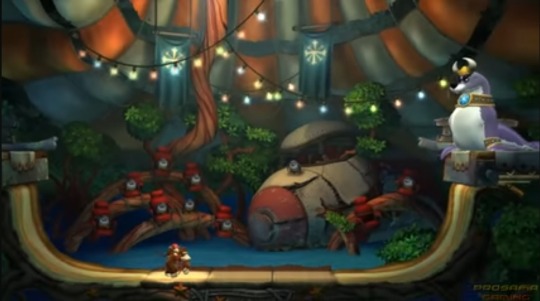
WHY ARE YOU SO BIG?
#txt#hey guys am alive just having a lack of motivation/energy sjebeuebkwen#but no fr WHY DOES HE LOOK LIKE HE'S BIGGER THAN BASHMASTER MY LIFE IS FILLED WITH L I E S !!!#for the sake of my mental health HE IS GONNA BE SMALL... small for snowmad standards cuz i still want him to be big#its for “figuring out a backstory for a 3 minute screentime character” reasons
4 notes
·
View notes
Note
If Ayin really was Dante, it would explain why we haven't seen or heard from him after his 3-line dialogue in Library of Ruina or why Ayin wasn't trying to stop Carmen in the Light like Angela did before she got pulled out by Roland.
Dear Anonymous,
Both of those are true, although I wonder if this would mean that Limbus would delve deeper into the interpersonal relations of Ayin post-Smoke War if he was apparently known by enough people to send Vergil to save him. What makes me also think it might be someone Ayin is guiding from the Light is the fact that the animal trio from the start of the game knew him, and considering who they are, it doesn't seem like Ayin would know directly...Unless, of course, he had to huddle with the Syndicates and lower-profile big-shots in the City prior to rising as a Wing to avoid any punishment from the Head for the experiments he ran in the Old Lab with its crew.
Personally, I'm hoping for it to be X or Ayin. I've heard arguments against that particular conclusion, such as the fact it would repeat the same twist twice of Ayin being an amnesiac or that most of the people playing Limbus now have no idea who he is and his reveal might not be that dramatic, but the reality is that Ayin and X as characters don't have half of the development and screentime what someone like, say, Yesod had, and that's when Yesod is one of the Sephirahs/Librarians on the lower end with screentime...or so it felt like, anyway. Ayin got, quite literally, three lines in LoR and somewhere between ten to fifteen minutes of screentime in LC, and half of his LC screentime was shared or focused on other characters in his flashbacks. It's only fair for him to get a chance to be fully fleshed out or at least be the hidden 'star' that Dante is following.
Although I can't deny that part of the reason I choose to believe this theory is that I'm simply a much bigger fan of the old PM cast, and I've spent the better part of what's almost a decade now hoping for some proper, juicy Ayin backstory, interactions, and character development ever since he was a faceless mysterious figure in 2016, and we still haven't really gotten that so far. A man can dream, no?
Ah, apologies for veering a little off-topic, Anon. I seem to lose myself when talking about Ayin, ahah. Until next time, be well, take care, and see ya'! Thank you for the ask!
18 notes
·
View notes
Text
My Love For The Eighth Doctor Books
Disclaimer: This essay is awfully long, the structure is terrible, and it probably shouldn’t have been over 4000 words, but hopefully, you’ll enjoy my insight of the Eighth Doctor Books.
Introduction
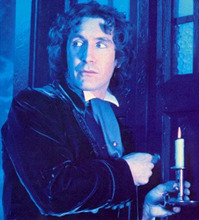
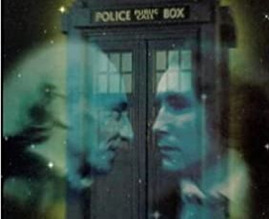
Trying to create a character around a brand new Doctor is tricky and Paul McGann’s incarnation is perhaps the biggest example for this. After 1996, he never had a TV appearance to fully flesh out the Eighth Doctor and remember: Big Finish didn’t use the Eighth Doctor until 2001. So writers in 1997 had a difficult task, especially when the Virgin Books lost the rights to the DW IP and were back in the BBC’s rights. Some Virgin New Adventure writers like Kate Orman, Justin Richards, Paul Leonard had come to write for the EDA’s, but new talent had to come in as well. They all had to intricately look at like, what, 40 minutes of McGann’s screentime in the TV Movie, half of which was the Doctor trying to figure himself out from amnesia and the other half is him being thrust into the plot without any way to truly develop his character. So… yeah, I actually can’t blame the writers finding their feet, at least with the VNA’s developing the 7th Doctor, he had 12 stories. Also, trying to pick up from the massive popularity of the VNA’s, and oh my God, I feel so bad for the writers. But, there could be a slither of a chance, maybe the magic they could have brought from the VNA’s can be replicated again. So, did it work? Hell yeah, it did!... just not under the guise of Uncle Terry Dicks. Just…screw everything about The Eight Doctors, it’s the worst possible starting point. But after that blip, yeah, it’s my favourite era of the Doctor Who IP, bar none.
Exciting Ideas
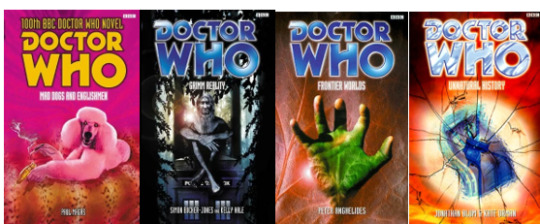
I’ll start off listing the sci-fi elements first before getting into character work. Much like the VNA’s, perhaps even more so, the EDA’s are not afraid to bring bold, extravagant ideas that TV Who could never do, perhaps not even what Big Finish could do, because of the novel format that allows descriptions and characters to fully grow. The Books are able to describe how a planet looks, feels, sounds, even down to taste so effortlessly, and a part of it is how unique, so bizarre, so beautiful these planets are, so… intimate. Could Doctor Who ever do planets like Albert (a planet entirely made out of Grimm’s fairy tales), Hitchemus (a colony world thriving on music and inhabited by intelligent tigers), The Crooked World (much like the Land of Fiction, except all the inhabitants and settings are cartoon-based). Not even Big Finish pulls off such weird and surreal settings and that’s because of the prose style allowing time and dedication to flesh out the multiple planets, without feeling clunky in its description and dialogue, which could plague early BF stories at times. But it’s not just the variety in the settings that make it great, there are also fascinating new ways to tell these stories with different formats. Narratives can be told in a Pulp Fiction-esque, out of order style (The Last Resort), told backwards (Festival of Death), books where the Doctor is barely in it but his presence is booming (Sleep of Reason), books told from the first person POV (The Turing Test, Frontier Worlds, Banquo Legacy), a narrative told from a non-fiction documentary perspective (Adventuress of Henrietta Street), a narrative told in a essay format (History 101), and that’s only a handful of the formats. There’s multiple pastiches and parodies; Trading Futures does Doctor Who crossed with James Bond harder than the Pertwee era, The Tomorrow Windows replicates Douglas Adams’ style down to a T, The Crooked World is basically Doctor Who crossed with Hanna Barbara Cartoons and many more. God, everything is so unique and wacky in this book range.
The Tone and Theming
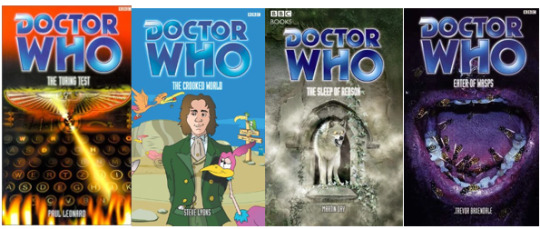
As for the Books’ tone, it’s certainly interesting. In the VNA’s, because a lot of new talent, and a lack of the BBC reigning things in as well as major inspiration from 90s cyberpunk media such as Judge Dredd, a lot of the books, especially in its first half, were extremely grimdark and gratuitous in order to show shock value for its audience (Timewryn Genesys had Ace sexually assaulted and The Doctor told her to just shrug it off and claim that it was part of the times they’re in and Warlock had unconsented bestiality and detailed animal murder). It was too far in my eyes, despite me saying that DW can be more than a franchise that is just whirling around in a magic police box. However, in the EDA’s, yes there is more sexual content, swearing like bastard, bitch and shit is still a thing, and there can be gory violence. But here’s where the EDA’s success at compared to VNA’s; it attempts to earn it’s adult elements. With the VNA’s, the grimdark nature was so constant to the point of normalisation, with hardly any degree of wonder or wit, especially from its regulars (thank God for Bernice Summerfield bringing some happiness at least). It does address and deconstruct the grimdark nature near the end, but God, even as a depressing cynical man, the likes of Blood Heat, Parasite, Warlock were just too dour for me to truly enjoy. But here, there is moderation and it feels contextual to the overall story. It enhances the story, not pollute it. The Spanish Civil War of 1936 (History 101) is written maturely and handles its mature themes in a thoughtful manner, Suicide and Depression is handled with sensitivity and intimacy (The Sleep of Reason), and when gratituous violence is used, it is detailed certainly but never glamorised and often times extremely terrifying instead of gore for the sake of gore (Eater of Wasps). Hell, even the most comical story, The Crooked World, has introspective themes of free will, the concept of death, existentialism and the value of a soul. But, it’s not all bleak, as said, The Crooked World is perhaps the most comical story since The Romans, anything involved with Iris Wildthyme as well as being weird abstract, is just laugh-out-loud hilarious, Jonathan Morris’ The Tomorrow Windows is pure Douglas Adams wacky humour, and Lance Parkin’s Trading Futures is majorly inspired by Roger Moore James Bond movies. The way the Books tackle true adult themes like Morality, Honour, Sexuality, Gender, Trauma, Redemption, the Philosophy of Nature and Identity, whilst being imaginative, humorous and endearing is… just poignant and beautiful.
The Regulars-Sam Jones
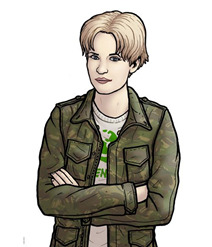
So… the regulars. Well, I’ll save the main two (The Eighth Doctor and Fitz) for last, because they will be the longest. So starting with Sam Jones (and yes, they do the ‘Smith and Jones’ shtick about a decade prior to Series 3), and off the bat, she’s easily the weakest EDA Companion and a bit of a inconsistency. She often suffered from writers who wanted to write her as the worst extremes of ‘Vegetarian Political Activist’, who constantly bitches and moans towards everything without any proper tact. And I don’t mind characters who don’t believe in tact, Cordelia from Buffy the Vampire Slayer/Angel is one of my favourite characters, but when Sam gives her opinions on everything in a pessimistic attitude without a degree of optimism… yeah my enthusiasm starts to drain really quickly. Doesn’t help that she’ll flip-flop between being a lovesick puppydog for 8, cynical activist or just… woman. But I will say that when she’s written under the likes of Kate Orman/Jonathan Blum, Paul Leonard and Paul Magrs, I absolutely love her character. She’s perceptive yet bright, naïve but willing to grow, cynical but willing to bring in entertainment. And I will say that her backstory is a fascinating deconstruction of the ‘Perfect Companion’ trope that Moffat loved to overemphasise. She had been manipulated, used as a pawn and twisted by the Doctor (although this is accidental) from the events of the TV Movie, and the real/correct one is just a junkie that couldn’t wait to stick a Heroin needle if it was given in front of her. It’s tragic, especially considering that when The Doctor fixes all his companions’ timeline much later down the line, Correct Sam becomes the correct version and it’s revealed that this version never travelled with the Doctor and died of an overdose, despite Fitz knowing her experiences they had together. I also love her exit story in Interference, she had become more enjoyable near the end and the story is able to show her resources. Unfortunately, the inconsistency up until Fitz joins just left me too much having a cold taste in my mouth for me to love her.
The Regulars-Compassion
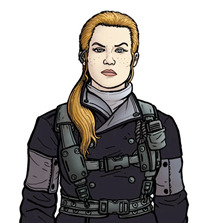
Next up, the human-TARDIS hybrid and Ice Cold Queen, Compassion. This is a character that I definitely appreciated way more after a first reading. The first time, I thought Compassion was too cold and aloof but on a reread, while she’s never going to be high on my list for favourite companions and I find her the hardest to analyse, I find that she works great as a hard-edged character, her dynamic with The Doctor and Fitz remind me a lot of 2/Jamie/Zoe, only if Zoe was way more upfront about her intelligence and rudeness. Her dynamic with Fitz as well is interesting as at first, they clearly despise each other for their clashing personalities and find each other untrustworthy but overtime, Compassion learns to enjoy Fitz’s goofiness and even learns to apologise. She can be destructive and violent with no emotion put behind it. That said, she becomes a more interesting character once she becomes the first Human-TARDIS hybrid, with the Doctor and Fitz forced to rely on her, but because of her cold hubris and after The Doctor forces a Randomiser thus violating her body, Compassion can become terrifying to The Doctor and Fitz. She does get brilliant material in The Banquo Legacy as well, with her possessing one person and her personality conflicting with the possessed person’s. And she has a decent farewell as well. Overall, I enjoy Compassion, it’s just really hard to analyse her considering that she only has 12 stories with the combination of perhaps a too subtle character arc.
The Regulars- Anji Kapoor
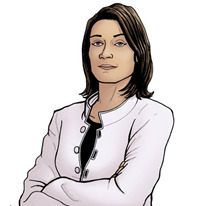
Now onto Anji Kapoor. If it isn’t for another companion that I’ll mention later, then Anji is certainly a close second in my rankings of 8th Doctor companions. And I also say with high praise that the 8th Doctor, Fitz Kreiner and Anji Kapoor team is my definitive TARDIS team… ever. You wouldn’t get that impression with her first story, as she has the trappings of an RTD Companion that you can pretty much guess a mile off. Stale relationship, life is going nowhere, working class, dead end job, jeez, I heard it all with Rose, Martha, Donna, Amy, Clara, Bill. The fact that she works in the stock market, an occupation I swear 98% of the population can barely figure out, and I felt like I was never going to like Anji. But Dang… Dang!!! The biggest glow-up happens in her very next story, and it practically sticks until her exit. I always felt that companions inbetween that period of Leela (arguably Tegan) and Anji never really basked in the pure absurdity of what world they were travelling in and never really gave any thought. The combination of new experiences around the universe and her haunting memories of her dead boyfriend was a lot to take in for her, to the point that she never really moved on (in Earthworld, she keeps writing emails to Dave, despite him being dead, and in Hope, she gives the secrets of the TARDIS over to the inhabitants on the exchange that they clone her boyfriend). She fell from grace multiple times, but with the Doctor and Fitz’s help, she was able to pick herself back up before spiralling down. What I love about Anji is despite her caring for The Doctor, she’s very distrustful to him because of his calculating and alien nature and both conflict with each other, their arguments almost feel too real. Anji often considers the options and is usually independent with her financial skills and intelligence. Over the 25 Books she’s in, she has become consistently enjoyable and a delight to read. Witty, clever, full of instinct, and humane, I did feel a proper sense of loss when she left.
The Regulars- Trix Macmillan
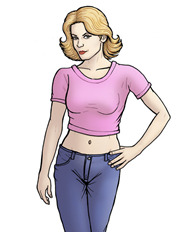
On the last companion, Trix Macmillan. She’s probably have the least amount of books in comparison to other EDA Companions (Sam had 25, Fitz had 51, Compassion has 12 and Anji had 25), with her only having 9 Books. Certainly not a lot of time to flesh out her character in comparison, but somehow the writers did it. What I love about Trix and what makes her a stark contrast to the first EDA Companion, Sam, is that Trix doesn’t want to be popular or well-liked. She’s logical, calculating, often devious, and often pretty tactless. She’s the kind of person who would steal a dead person’s identity and money. She treats The Doctor and Fitz not as friends, only acquaintances. But not just that, she can be (intentionally) a walking contradiction. Much like a showbiz actress, depending on what environment, time and crowd she’s working with, she’ll immediately change her personality. To the point that Trix doesn’t even know her true personality, and she is scared that she wants to know what she used to be. She likes being anyone but herself, wanting to become inconspicuous around the Doctor. Her relationship with the Doctor is interesting as well, he is judgemental towards her hobby as a conwoman, believing that she’s only with him and Fitz because she’ll steal whatever she can get. But as time goes on, he learns about her contradictory personality (most likely relates because of his own contradictory personality), and sees her, the real her. And despite her trying to detach herself from The Doctor, she slowly, but surely, opens herself more to The Doctor and Fitz, to the point that she feels hurt when The Doctor accuses her. Even with the short runtime, I found her relationship with Fitz to be really touching, and shows that Fitz’s open loyalty works in tandem with Trix’s cold secrecy. We don’t get much information about her past, but in a way I enjoy the lack of answers, whether she’s just a conartist or perhaps a chameleonic alien, what her relationship was like with her father. And maybe that’s the point, with her shape-shifting and unpredictable personality, she’s meant to be an enigma. At the very least, with 9 books, she had become a fascinating character that was wonderful to read and analyse.
The Regulars-Fitzgerald Kreiner
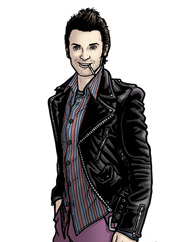
Now, my favourite companion in all of Doctor Who media, Fitz Kreiner. Better than the likes of Jamie, Donna, Sarah Jane, Ace and Evelyn. Before with Sam and The Doctor, the books were of varying quality, but as soon as he was introduced, even with a bit of a terrible debut story, he brought such humour that made the story just about bearable. He’s a bit of a goofball with some addiction for cigarettes and alcohol, but he starts becoming one of the most complex and special characters in the franchise. He begins as a bit of a James Bond-esque ‘Lady’s Man’, often trying to flirt and womanise, but by his third Book, Revolution Man, the development truly begins. He gets kidnapped, tortured and brainwashed under the influence of alien drugs and forced into shooting a man, with the Doctor forced to finish the job off for Fitz. He’s obviously going to have lasting effects that will damage him in the long run. But Damn, it doesn’t stop there, Interference leaves him in the absolute gutter with him being trapped in a membrane for 600 years, and resents the Doctor for failing to rescue him, and joins up to 8’s longlives enemy, Faction Paradox, and is converted to be a monster, becoming Father Kreiner. And it’s tragic, given his PTSD shown from Revolution Man. But that Fitz is gone, and what stays with the Doctor until the end is a clone of him, with full memories and everything. So thankfully, the loveable oaf never truly went away and only gets better from here. Much like how the 2nd Doctor was perfect for Jamie, or how Ian and Barbara are integral for the 1st Doctor, Fitz is ideal for 8. During the period with Compassion, he wants to prove that he’s the real Fitz, but can’t, because he isn’t. He may have the OG Fitz’s memories, but he can’t dream and thinks that some memories are missing. Even some aspects of his personality are different, like his skills of hiding and blending in easier. He may be a doofus, and hard to catch on certain things, but much like Jamie, he’s street-smart, and is able to spot simple situations that The Doctor wouldn’t give a second notice because of his desire for over-complicated situations. Even with him not being as bright, he’s able to hold off on his own from the Doctor, as in Trading Futures, he’s able to defeat Time Lord-wannabe Space Rhinos (no, not those kind of Space Rhinos) on his own without any of the Doctor’s help or knowledge by impersonating the Doctor, even willing to sacrifice himself. He’s the flame behind the EDA’s for me, the one who is willing to sacrifice everything he has to save whoever he considers family, and the bond that the Doctor and Fitz have together is inspired. He is fiercely loyal to the Doctor, even when he is kept in the dark. They both have a connection towards each other, like a mix between 2/Jamie and early 8/Charley, with Fitz even willing to hold the heavy memories of what 8 did to Gallifrey, even when The Doctor threatens to break every bone in Fitz’s body. He was the best friend that 8 could ever have, I loved their kindred relationship and it was totally worth it having Fitz for 51 Books to become such a developed character. My favourite companion, bar none.
The Regulars-The Eighth Doctor
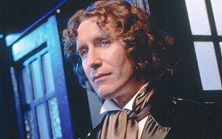
And now, finally the Eighth Doctor. Before, I used to cite the Eighth Doctor from Big Finish as the definitive incarnation. And don’t get me wrong, I still love him in the Charley, Lucie and even the Doom Coalition era. He has brilliant gravitas in showing intelligence (arguably the most intelligence since the 4th Doctor), dry morbid humour, the right amount of patronising, and enthusiasm, often excelled by McGann’s excellent performance and Shakespearean voice. But, as time goes on, the era becomes more… how do I say… schizophrenic and uneven. Big Finish sort of starts off creating arcs for 8, but then… sort of wander off and never pick up on arcs they’ve created, like the 800 year maroon in Orbis, the angst in Dark Eyes, then finally culminating with Moffat’s Night of the Doctor, not picking up on his hatred for the Daleks after Lucie Miller’s death, and making him too naïve to the Time War, making it as if his journey from BF didn’t even matter.
Then came my experiences with the books. And discarding the first novel, The Eight Doctors, and jumping straight to Vampire Science, Jonathan Blum and Kate Orman immediately gave 8 more nuance than 75% of 8th Doctor material in BF. I should preface by saying this as well: despite my grievances from the Virgin New Adventures, I still think that the character of 7, Time’s Champion and its character work are still crucial to the EDA’s and how it conflicts/supplements 8’s character. 8 is no longer Death’s pet, stuck to the chains of fate, but much like 7, in the eyes of others, he is simultaneously whimsical, dangerous and manipulative, albeit more flawed than 7. When 7 manipulates, it’s more out of logic, thinking about the bigger scope, while with 8, it’s out of passion and love. He often uses his good looks and often childlike grin as a front to scheme, as evidenced in Genocide. But unlike the 7th Doctor, it’s never constant to the point of predictability, and sometimes, even his manipulation messes up due to his conflict with his passion and childlike personality. I’d argue that 8 is the most anti-hero incarnation of all the Doctors, even more than the 7th Doctor, often obliviously selfish, privileged and at times very toxic and callous. He often doesn’t let other people in on his schemes (him faking his own death to his companions in The Banquo Legacy), often clings onto people out of fear of losing them (Sam in Interference), pulls strings for his selfish needs (uses Alan Turing’s sexuality as blackmail to make Turing help him help aliens but on the basis that the Doctor just escapes Earth in The Turing Test), puts others on the brink of death (orders a possessed wasp-human hybrid to kill one of his closest patients to test if his true personality is still there in Eater of Wasps), often be cold-blooded and violent (throws a medic against the wall head-first and then stuffs him in a cupboard in Vanishing Point). In the second half of the Book range, he had lost his memory from his battle and destruction/erasure of Gallifrey, but here’s why this memory erasure works as opposed to other ones, like in Big Finish. For Big Finish 90% of the time it’s used, it’s often to create false tension. At times, it’s fine, but when it’s used constantly to pad out the runtime, my enthusiasm starts to wane out quickly. But Justin Richards as Book Script Editor brings something interesting. For the first time, the Doctor isn’t bitching about where his memory is, but rather, he’s a mirrored version of the 1st Doctor (my second favourite incarnation): full of rage, irritative, deceptive, arrogant and willing to fill his hands full of blood. The difference is there is no Ian or Barbara to hold him back, to make him grow, 8 must be the one to grow and develop himself, he has to make the work into becoming The Doctor. That’s another reason why I adore the 8/Fitz/Anji team so much; they are all broken, damaged people with flaws, and call each other out. But they are also a trio of friendship, love, can bring unity towards each other and most importantly, feel like a family, in fact probably the most family-like team since arguably 2/Jamie/Victoria or even since 1/Ian/Barbara/Vicki. 8/Fitz/Anji have truly descended into tough times (Fitz especially), but this team shows that you can pull yourself back from the depths of hell when you have the right support going for you.
Writers like Lance Parkin, Paul Leonard, Lloyd Rose, Kate Orman, Steve Lyons, Mags L Halliday, Martin Day, Lawrence Miles live and breathe the 8th Doctor, a true Bryon Romantic, poetic and literal with words. He’s a diplomat, rather than a conqueror. He may be brutal, manipulative, and cold-blooded, but it’s equally mirrored with empathy, mischievous humour akin to the 2nd Doctor, and a lust for the unpredictability of humanity. Yet unlike how Modern Big Finish and Moffat’s Night of the Doctor made 8 into an ineffectual pacifist buffoon, Book 8 is certainly an optimist, but he’s also a realist. In Reckless Engineering, he was given the choice between saving the correct timeline in the universe but at the cost of his friends or let the universe collapse… he actually chooses the universe. It’s a shocking moment (especially for Fitz, considering how long he’s been with the Doctor), but even he knows that, but has a responsibility to save the right reality. And with some introspection, nearing the end, he realises that, because there’s a gorgeous insight in The Sleep of Reason, about focusing too much on the bigger picture and the few things is equally as important. To see 8’s goals come to fruition, he brings it to himself that his mission of helping even just one individual can be seen as the greatest thing in the universe. He doesn’t want to remember the events of Gallifrey near the end because at the end of the day, he’s a man who strives for the present and future, not the past. He may not be a good person, he may not be right sometimes, and he may not have a happily ever after with destroying Evil for good, but he’ll still keep going on just to make a difference. That’s why I adore the ambiguous ending to The Gallifrey Chronicles, we never get a confirmation as to whether the Doctor survives his plan against the Vore, we never get what his plan is supposed to be and whatever happens after the battle (besides a song from Fitz closing off the book). I prefer Doctor Who to have an ambiguous non-conclusive ending than what Marc Platt did for Lungbarrow or Colin Meek for Death Comes to Time. This version of Eight has now become the definitive incarnation of The Doctor for me, I adore this character so much.
Conclusion

To me, The Eighth Doctor Books, especially in the second half, truly encapsulates everything that I love about the franchise: superb prose, introspective themes, emotional moments, pushing the boundaries of what Doctor Who could truly do but never accomplish. The writers made something special, and made the range one of the most suspenseful, sombre, intimate, and beautiful pieces of fiction I’ve ever experienced. I love them, and to me, they are my Doctor Who.
13 notes
·
View notes
Text
Slackin’ with the Sleuth: reviewing Netflix’s “The Slippery Slope”

The third season of Netflix’s unfortunate adaptation may be the best one, but it’s also the most chaotic. The map is not the territory; in spite of the writers’ insitence that everything was carefully planned out, it’s pretty clear that the production went through some troubles along the way. The good news, however, is that the staff knew how to land on their feet as they fell. Part of what made “A Series Of Unfortunate Events” great in the first place was its love of improvisation: it was virtually unafraid of trying new, exciting things, and the author figured it out as it went along to create something truly unique in terms of absurdist, experimental literature.
The right word to qualify this first double-episode episode is "ambition". Ambition to expand the universe created by the books, to improve it, even. It's transparent that Daniel Handler was taking the opportunity to reboot his own series as he adapted it in the first two seasons of the Netflix show. Let’s elaborate after the cut.
As he's admitted several times, "A Series of Unfortunate Events" was mostly improvised by necessity. Contrarily to other series (such as Harry Potter's extensive seven-books plan), Daniel Handler signed a succession of three contracts. This prevented him from really planning out the mysteries of the series and their resolution, as he never knew how many books he would get to deal with them. It's no surprise that the books end with many plotlines unresolved. The Baudelaire orphans do not have enough time to solve every mystery in the world, and never did the author. The vagueness of the books is a deliberate testament to the uncertainty of existence, but it's also a practical consequence of the author's obligations.
So what we get with Netflix is a taste of what "A Series Of Unfortunate Events" could have been with its training wheels off. Everything about the Man With Beard But No Hair and the Woman With Beard But No Hair is proof of that. The idea of making them Olaf's surrogate parents is, simply put, genius. It brings so much to Olaf's character and grounds him in a very accessible reality. It's implied in the books that Olaf is largely replicating onto the Baudelaire orphans what was done to him, as he used to be an orphan himself. A classic tale of bad parenting repeating itself. The series takes this interpretation and runs with it: Olaf, twisted and warped by his two mentors, became obsessed with recognition. His unability to recognize how abusive and manipulative the two judges are is heartbreaking and deeply poetic.
Special emphasis was also given to the kidnapping of the Snow Scouts and its indirect consequences. The series decided once again to spell out what the books only talked about in whispers, and the result is glorious. The panoramic shot over the many fires starting all over the city broadens the series' scope and infuses the viewer with an ovewhelming sense of dread. It's a much more important shot than first appears. While reading the series, one gets the feeling that the Baudelaire orphans' story is but one of many stories set in this universe... which is why Lemony cannot give us all the answers. He can only give us a conclusion to this story, not to the mystery of V.F.D. or its sugar bowl or its Bombinating Beast, because they depend on several barely-related stories. We will never know what happened to all the Snow Scouts or their murdered parents, and that's okay. It's just a story for another day. In a way, the treatment of the Snow Scouts in the Netflix series helps setting up the viewer's expectations for "The End" and its unorthodox way of ending the plot.
Despite Season 2 and 3 being commissioned at the same time, there was a noticeable shift in direction and writing between the two. Daniel Handler's "firing" from the series (more on that in a later review) attests to that. So do the derisive criticisms of showtunes in Season 3, a clear response to Season 2's perceived overabudance of musical numbers. This response to bad reviews also shows in the way the fall of the caravan is filmed: it’s a genuine action sequence, full of tension and dread, with sorta-realistic physics. A far cry from the goofy destruction of Josephine’s house in Season 1.
Jacquelyn is conspicuously absent from the cast this time, which is due to Sara Canning’s ongoing salary dispute with Netflix but may also have been a response to critics. There are considerably less subplots in Season 3, which stays focused on the Baudelaire orphans for the most part. Instead the Netflix series fleshes out Kit Snicket, while giving K. Todd Freeman something to do to justify his main cast member salary. His introduction in "The Slippery Slope" is awkward as all get-out (as he shows up in the Mortmain Mountains out of nowhere despite last being seen in the city), but it's probably for the best. There's clearly been a retooling of the plot to accomodate Kit's existence and refocus the series in a more straigthforward direction. Kit clearly got parts of the sugar bowl plotline which was originally intended for Jacquely (she even becomes Poe's sorta-secretary!). For the same reason, the part of Nero in "The Penultimate Peril" was also probably intended for Eleonora Poe in the original scripts (as Eleonora Poe is a stand-in for Geraldine Julienne in the Netflix show). This replacement may have more to do with the actress' availability, unless the writers were deliberate trying to downsize the cast. We already know that Charles and Sir were also supposed to come back but that a tsunami prevented an actor from showing up on set (yes, really). Actor unavailability seems to be a running theme this season as Nathan Fillion is also missing. It's a shame, as Quigley and his mentor Jacques Snicket lived their own adventures off-screen in the books. If there was an interesting subplot to expand on, it was that one. Quigley gets more screentime than his siblings, but he could have been fleshed out a little more.
Education is the main theme in this episode, from Olaf's traumatizing teenagehood coming back in full force to Fernald oversharing his personal backstory. It's the right place to dot it: most of the original book centers around Quigley explaining how much the current generation of volunteers was being indoctrinated without their knowledge, and the Baudelaire orphans wondering if their parents would approve of their moral choices. One of the season’s greatest scene is an added one where Sunny ties a ribbon in her hair in homage to her sibling. The writers were keen to include this “passing of the torch” moment as practical considerations complicated the evolution of Sunny’s abilities. She speaks mostly in intelligible words in Season 3, and this emotional scene is a good trade-up to hammer in her character development.
As readers have already observed, the double-episode decided to make the rest of the troupe (save Fernald) leave Olaf in this episode. From day one, the troupe was mostly conceived as one integral character anyway, so it makes sense to make them leave together rather than "kill them off" in a series of unfortunate accidents. The white-powdered women's was by far the best exit, and it's the one the writers kept. More controversial is the unceremonious killing of the three Carnival Freaks. On one hand, it's true that "The Penultimate Peril" works without their presence, and their death efficiently signals viewers that the sinister duo means business. It's also partial motivation for the troupe leaving Olaf (as they're afraid they're next on the kill list). On the other hand, the inclusion of the Freaks in "The Slippery Slope" feels kind of a waste. Couldn't the writers have given them something to do instead of just dying three minutes after joining Olaf? For all we know, they could have been left behind at the Carnival, and come back at Hotel Denouement to accuse the Baudelaire orphans of ruining their lives. In a similar fashion, Hal is by far the missing piece of this season. The Baudelaire orphans ruined his entire life and betrayed his trust; his testimony could have turned the entire trial in a very interesting direction.
Contrarily, the writers also know that bringing back sometimes just isn't worth it. Take Bruce, for example: he's barely a footnote in the books in which he appears, and has no discernable character. No fan will complain that he was replaced by a new female character (derisively renamed "Brucie"), who actually has an arc in this double-episode. Slavish faithfulness can be as bad as unnecessary changes when it comes to adaptation.
#0548#review#asoue netflix#ASoUE#a series of unfortunate events#daniel handler#man with beard but no hair#woman with hair but no beard#bruce#hugo#colette#kevin#white-powdered women#Quigley Quagmire#count olaf#jacques snicket#eleonora poe#geraldine julienne#vfd
286 notes
·
View notes
Text
https://queenypie.tumblr.com/post/180408886658/rwby-and-how-it-treats-its-women#notes
Oh goody, trying to point out ‘problematic’ material.
I’ll get this out right now: older women are treated the absolute worst by this show; they’re treated worse than black people, worse than LGB characters, and worse than the younger women.
The ways in which women are treated can be divided into three categories: dead, evil/terrible person, or brushed aside. Dead obviously describes Summer, the one potentially kind mother in this show. The second group is what Willow and Raven fall into. The last category is for Glynda, and Kali.
A. Willow is not shown to be a terrible person. Fuck, she’s played more as a victim than anyone else. meanwhile her male counterpart Jacques is treated as WORSE than the Hitler-esque character.
B. Raven is a terrible person but her gender has nothing to do with who she is as a person.
C. Kali is most certainly NOT brushed off since she’s constantly acting as a second Sun.
D. Glynda’s is the result OF problematic shit with her VA.
And E:
Dead: Ozpin
Evil/Terrible person: Jacques, Adam, Tyrian, Watts, Fennec, Corsac
Brushed off: Taiyang, Klein
Looks like the women are doing better than the men here.
In Glynda’s case, she is given one major action scene in the very first episode of the show before being relegated to Ozpin’s maid. Either she fixes the streets, she fixes the school, or she fixes Qrow’s or someone else’s mess.
Because Kathleen said some super sexist shit but nope, not gonna mention that.
Then there’s Kali Belladona, who gets to lucky shot someone with one of her guard’s guns before dropping furniture on another guy; meanwhile, her husband gets to knock people around.
Kali Win Record: 3-0
Ghira Win record: 0-0
So when’s the post about Ghira getting shafted.
Then we have Willow Schnee, who isn’t so much a character as she is still just an abstract concept. We know more about her from lore and exposition than actually seeing her in action. We also have the other horrible mother Raven, who is the only woman -besides Glynda- who gets to do anything action oriented.
A. We also only know that about her father, Nicolas. So...
And B. Again, Raven’s gender has nothing to do with who she is as a person. She’s also treated with more sympathy and more attention than Jacques so it STILL doesn’t work. Fuck at least Raven has an impact on the plot, UNLIKE Taiyang.
Being a bad parent or being passive isn’t objectively a bad thing, however I just listed every major older woman in this series to date. I could talk about Salem, but she would just fit into the evil category.
Except, you know, not by anything but circumstances she couldn’t have seen coming.
By contrast, older men can be good (Ozpin?, Port, Oobleck, Qrow, Tai, etc.), fatherly (Tai, Klein), complicated (Ozpin, Qrow), Evil (Watts, Hazel), Assholes (Jacques); While women can be categorized in 3 groups, men run the gambit, and that’s not okay.
Dead, brushed off, brushed off, relevant, brushed off, brused off, evil evil and evil.
Also, you rejected Kali but accept Taiyang and Klein, both of whom have contributed LESS to the show than Kali. So nice try,
Looks like the guys actually have the shaft.
Also, wanna know what this also sounds like? Sailor Moon, better go call THAT Author problematic!
Then we turn our attention to the main generation, rwby, nora, Pyrrha, and many others. Pyrrha has the obvious problem of her entire character revolving around Jaune, while Nora only -but still glaringly- has the problem of her backstory being 90% focused on Ren. Weiss has the whole dance arc in volume 2, which relegates her to a trophy for Jaune to fight Neptune over.
Okay, let’s go through this shall we?
A. Ruby has shown more mourning and development over Pyrrha than Jaune.
B. Nora is an active character while Ren does nothing 90% of the time and is often times needed to be bailed out by Nora *cough* Nucklevee Hazel *cough*’
C. She also had most of Volume 4 to herself. So....
D. Weiss also got to demand Neptune be beaten up for flirting with another team but god forbid Jaune ask her out 3 times.
And then volume 4 hits: Ruby gets her character develop stolen by Jaune,
Right up until Episode 10 where Ruby takes Jaune’s character and keeps it under lock until an ENTIRE VOLUME LATER and even then the guy’s actions amount to jack and shit.
Weiss has to be rescued by her butler from her evil dad
Said butler’s entire character revolves around Weiss.
Blake runs to see her father and Sun
Both of whom are treated as inept and useless while her mother is the only one shown to know what to do.
and Yang has to be talked down to by her dad
Where she insults him and no one bats an eye at him. Also: HIS entire character revolves around Yang.
So 0-4, you failed.
When one or two of these things occur, it’s not a problem (minus the Jaune bit); when it becomes a pattern, you messed up.
And yet when it becomes a COMPLETE pattern with men, no one cares.
Where are the adult female role models?
Dunno, where are they in Sailor Moon?
Oh right, the only one who isn’t evil/a bitch (Kali) gets to talk to Blake personally for one minute and it’s only to say that her father wants her.
All while giving an air of ‘I know what is best for both of you’ while Ghira is portrayed as a completely awkward idiot who can’t talk to his own daughter.
Volume 5 at least has the decency to give the female leads agency again, but Raven is suddenly treated like an obstacle instead of Yang’s goal, while Weiss is nearly killed so that Jaune can unlock his semblance.
A. An obstacle that takes up the majority of the screentime sure.
B. Jaune then proceeds to heal her and do nothing after removing the one impact he had on the battle.
And C. Ren is thrown against a wall and needs bailing out by Nora, Adam gets one shotted by Blake, Mercury is treated as a prop while Emerald gets some actual characterization, Jaune does NOTHING, Sun accomplishes nothing, Leonardo is treated as a joke unlike Raven, Qrow gets tossed around like a ragdoll and Ozpin/Oscar do basically nothing.
And yet no talk about this.
Volume 6 has, to date, given us a topless genie for no real reason other than sex appeal, and Salem’s backstory, where she only became active when a man entered her life and became evil because that man died.
A. So...Salem is Jaune and Ozma is Pyrrha then?
B. Salem is also the only proactive one between the two, she manipulated multiple world leaders BEFORE becoming immortal, she cheated the MALE gods, she’s the one portrayed as in control of the relationship with Ozma and she is the one who actually has agency.
And C. And yet examples of male fanservice (like Ironwood losing his shirt)go unnoticed.
And finally, the bit that has been said many times: when a female in this show acts out, does something compulsive and rash, they’re punished for it. Yang flying at Adam to protect Blake and Winter attacking Qrow for egging her on; both are reprimanded after. Jaune losing his temper and attacking Cinder? Obviously a hero, because despite Weiss nearly dying, he healed her and unlocked his semblance, so that makes it okay in the writer’s eyes.
A. Qrow is also reprimanded (in fact, MORE SO than Winter)
B. Jaune proceeds to remove HIS OWN AGENCY and do nothing the whole fight.
C. He utterly fails to do anything to Cinder, gets saved by Ruby and gets insulted for his actions while being portrayed as helpless. Yeah, real great hero.
For a show that wants to focus on four young women, it has an awfully tough time treating women as equally unique as the men. Older women in this show are either good because they’re passive and obedient (Glynda/Kali/Winter) or active and evil/rebellious (Raven/Salem/Cinder/etc.). Younger women must be taught by fathers or male friends on how to act. While that’s not what the writers intended, it’s what the show comes across as saying.
Except Winter rebelled against her father
Kali messes around with everyone and is treated as the more level headed of the two.
And Glynda’s temper is glossed over while Ironwoods paranoia and Qrow’s alcoholism is over looked.
Raven gets sympathetic moments.
Salem is THE most proactive person in the show
And Cinder is the longest running antagonist.
Now let’s go through the male characters shall we?
Torchwick: Repeatedly humiliated and defeated by four students constantly with only his FEMALE minion making him threatening: Gets killed off with no fanfare.
Port+Oobleck: Irrelevant
Ozpin: Is used for the development of Salem, is the toy of the gods and cannot do anything to stop Salem.
Jaune: Loses all agency and becomes a background character to the point his only development in Volume 5 is basically the writers (mostly Miles) telling him to shut up and look pretty.
Ren: Hasn’t won a fight since Volume 1, needed to be bailed out by Nora from both the Nucklevee and Hazel, barely says a damn thing and is overlooked for Nora most of the time.
Cardin: Asshole bully with no redeemable features (unlike Weiss)
Mercury: Is ignored by the narrative for Emerald all the time and said about two lines in Volume 5. Is also shown to be less moral and more evil than Emerald
Taiyang, Klein and Ghira: have no characters outside of being father figures to their respective daughters. Unlike Raven and Kali.
Jacques: Is treated as Snowy Satan to make Weiss, Winter and Willow look good.
Nicolas: Is only shown in a WOR to set up Willow, Winter and Weiss’ conflict.
Whitely: Is treated with contempt and derision by the narrative despite being in the same situation as Weiss.
Adam: Is no more than an abusive ex and evil racist to make Blake look better. Unlike Illa and Sienna.
Tyrian: Utterly insane, gets humiliated by Ruby.
Watts: gets pushed aside by Cinder
Hazel: Entire character revolves around dead sister.
Need I go on?
From where I stand: Male characters either have no personality outside of female characters (Taiyang, Klein, Ghira, Whitely, Nicolas), treated with far less care than their female counterparts (Torchwick, Adam, Whitely, Jacques, Mercury), have no character (Cardin), are just evil with far less sympathy than their female counterparts (Tyrian, Watts, Adam and Mercury), have their agency taken from them (Ren and Jaune), aren’t proactive (Ozpin, Port, Oobleck) and more.
But hey, can’t stab the creators over problematic shit with guys. Or showcase the guys issues since it would destroy your argument.
10 notes
·
View notes
Text
Now that I've slept and I'm not as pissed, let's talk for a minute. To avoid hatemail, my opinions are below. Don't like, don't read. Not tagging besides my personal tag so if this ends up in a tag, not my problem.
Meiko may not be your favorite character and that's fine. She's not the reason why Tri is bad though. Honestly, she's one of the only good parts of Tri. We have this brand new character with an interesting story. I mean, you can argue its not original because it's similar to Digimon: The Movie (well Hurrican Touchdown/the final part) with the brand new person's Digimon has a virus and we have to save it and/or stop it. But you know, Wallace/Willis never got hate and most of you wished he would show up in the main series.
Anyways, back on topic. Meiko is not a mary sue. She doesn't exhibit any mary sue qualities. And honestly, when have people cared about mary sues in Digimon? Like I feel Taiki/Mikey would be a better example of a mary sue because (at least earlier on in xros) he could do nothing wrong, did everything perfect, etc. And yet, no one has a problem with Taiki.
Let's talk more about new character editions. Nobody seemed to have problems with Hikari/Kari being added to the Adventure cast even though god posseses her (homeostasis is kinda like a god, right?). Nobody bitches that her partner is a champion level or that her crest works right away. I mean from what I remember, Adventure Hikari had like no personality besides "I love my big brother" and apologizing about everything. Then we had 02 and y'all still bitch about the new characters, well until about halfway through Tri anyways. Okay, 02 may not be my favorite season, but it has good characters and it introduced armor and jogress. Up until about movie 3 or 4 of Tri, y'all were chanting "Retcon 02" and "get rid of the 02 kids". There have always been mixed opinions about 02 in the fandom. Mostly due to the epilogue for shipping reasons. And the Adventure kids (minus Takeru/TK and Hikari) being pushed to the side for the new kids.
Ah, I thrink I figured out why everyone hates Meiko now. You guys don't mind mary sue characters, characters with higher level digimon, characters who are introduced for plot, or characters whose partner gets a virus. It comes down to screentime and shipping. If Meiko was a boy like Wallace, there would be no getting in the way of shipping. And I mean, there's only one ship people are worried about with Meiko, and endgame of her and Taichi/Tai. Because she ain't gonna effect the canon ships of Yamato/Matt and Sora or Ken and Miyko/Yolei. And those are the only canon ships within the Adventure Universe. (And based on the assumption that there will be only heterosexual relatioships) that would leave Taichi, Takeru, and Koushiro/Izzy. Because Jou/Joe has a girlfriend. And we know Koushiro ain't getting with her due to his crush on Mimi (which doesn't go anywhere after based on the epilogue, but I'm happy for whoever gets to enjoy the ship tease for now). Takeru has potential for Meiko, but I don't think the they'll be together. But with Taichi, main character and his interactions with her have potential to end up together. Just to make it clear, I DO NOT GIVE A FLYING FUCK ABOUT SHIPPING. I am just making speculations here. But, based on how half of the fandom (mainly due to the english dub) is still pissed off at how Taichi and Sora is not canon, these people would not like to see Taichi with anyone else so they would hate Meiko for getting in the way of their ship. I'm done with talking about shipping.
As for stealing screentime, I have one big issue and its the same for 02. The new characters are the plot. Take away the new characters and no plot. "But you could write it so its only Adventure uwu". 02 would have been pointless if it focused solely on the Adventure squad. They all reached their max level that they could at the time and what else new could they do? I liked how they mentored the next gen and we got a lot of new things that the Adventure cast wouldn't have been able to do. So take away Meiko from Tri and you loose the Digimon, you loose the virus, etc. It turns into some high school anime, and honestly, as someone who is here to watch Digimon and cares about the Digimon I don't wanna watch a high school anime. Sure they could've incorporated the Digimon some other way, but most likely through some new kid and they have a problem and need Digimon. Basically another Meiko. Meiko hasn't stolen any screentime. She rarerly has solo screentime in the films other than when were learning her backstory WHICH IS IMPORTANT TO THE PLOT. Take away Meiko and Tri doesn't exist. Look, I don't really like Tri but I like Meiko as a character and enjoy what she has brought to the table so far. Nobody is really giving any valid reasons for hating her. And trust me, if the 02 kids were in Tri, they'd be stealing way more screentime than Meiko and it wouldn't be relevant to the plot.
I'm ending this earlier because I gotta go finish moving but yeah. My thoughts on the Meiko drama. First character we've ever needed a defense week for which is bullshit. You guys don't even do hate for frontier, savers, and xros as nearly as much as you do for her.
17 notes
·
View notes